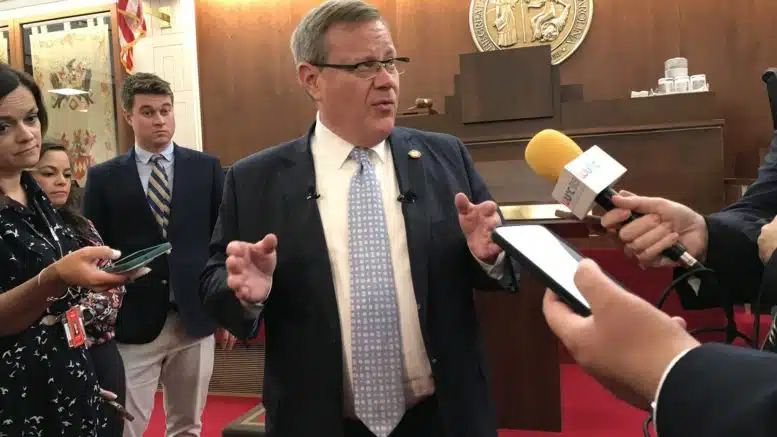By Rose Hoban
Senate leader Phil Berger was blunt when asked Tuesday whether Medicaid expansion would move forward without a state budget.
“No.”
That’s all the Rockingham County Republican leader had to say about the issue on a tense afternoon as lawmakers continued the protracted struggle to come to terms on a state spending plan for the next two years
This is not a Republican vs. Democrat issue: the Republicans cannot agree among themselves what will or won’t be in a state budget that will guide about $30 billion in spending. Lines have been drawn and seem to be set in stone.
Senators want to include provisions in the budget — which is being negotiated behind closed doors — that would allow for development of as many as four casinos across North Carolina. Members of the House of Representatives — in particular about 22 members of the highly conservative Freedom Caucus — say no to that.
Without those Freedom Caucus members, House Speaker Tim Moore (R-Kings Mountain) said that he only has 42 Republican votes, not enough to push such a budget over the line, especially if Democrats are not on board. There certainly would not be enough votes for an override if Democratic Gov. Roy Cooper were to veto the document.
Berger told reporters Tuesday afternoon that he was moving to pass the budget through the Senate chamber and send it to the House. Without mentioning Moore or any of the House leaders by name, Berger said he wanted them to “honor their commitment.” Otherwise, Berger said, he was willing to let the chips fall where they may.
Berger would not be open to a budget without provisions for casinos, he said. Full stop.
Moore told reporters something similar Tuesday afternoon. He’s planning on having his chamber vote on a budget deal without a casino option and send it to the Senate. That’s no casinos. Full stop.
If the two chambers can’t agree, then the entire budget process appears to be hopelessly deadlocked.
What’s at stake is Medicaid expansion, which is tied to passage of the state budget. Also at stake is funding for countless other projects around the state: water treatment plant upgrades, more mental health beds and raises for teachers and other state employees.
More than just health care on the line
“The delay of Medicaid expansion has cost North Carolina billions of dollars, especially in rural communities. And caused heartache for hundreds of thousands of hardworking folks,” North Carolina Health and Human Services Sec. Kody Kinsley posted Tuesday morning to X (formerly Twitter).
Later in the day, Kinsley told NC Health News in a text message that the statement “is still capturing my current frustrations.”
Abby Emanuelson, head of Care4Carolina, a coalition of 188 health care and community organizations that has been advocating for expansion for years, issued a statement Tuesday after hearing about the deadlock
“With 600,000 North Carolinians stranded in the coverage gap, it is time for our legislature to decisively act to implement Medicaid expansion,” the statement read.
“Care4Carolina coalition respectfully but urgently calls upon the NC General Assembly to make good on its promise to close the coverage gap by either passing a state budget that will trigger Medicaid expansion or decoupling expansion from the budget.”
Berger signaled that he would not be open to “mini-budgets,” which were used during a 2019 budget standoff with Cooper over Medicaid expansion to allow the state to move forward and fund specific departments.
That could leave state funding subject to a continuing resolution that sets funding to state agencies and contractors at last year’s spending levels.
Many nonprofits have been providing services past the July 1 start of the state fiscal year, based on the assurance that they’d get paid retroactively once a state budget gets passed.
In addition, there’s federal money for services such as supports for people with disabilities, Meals on Wheels for seniors, maternal child health initiatives, child care subsidies and dozens of other programs funded by federal block grants and other federal funds. Much of that money has to be authorized in a state budget document for it to be released to the service providers.
Without a budget, services that hundreds of thousands of people across the state rely on could be in jeopardy.
Health care priorities could be lost
“We’ve asked for money to try to fill in the continuum of care for kids to keep them out of the hospital and to keep them from sleeping in the offices of local departments of social services,” said Karen McLeod, a lobbyist who represents children’s services providers. “There’s supposed to be funding in there for that.”
McLeod also ticked off other funding priorities she’s been told are in the budget, including:
- Medicaid rate increases in the budget, including funding for direct support workers who work with people with disabilities
- Pay incentives for psychiatrists and psychologists
- Increased funding for nursing home workers
- Medicaid expansion money for rural hospitals
“People don’t think about that,” McLeod said. “That’s a lifeline that would be gone.”
“Many working North Carolinians are depending on expansion to provide the care to treat cancer, heart disease, diabetes and other pressing health issues. Many hospitals are depending on expansion to ease crushing financial pressures,” Emanuelson said.
“The delay affects community hospitals, including in our state’s rural areas,” Cynthia Charles from the North Carolina Healthcare Association, which represents hospitals, told NC Health News in an email. “As a recent report found, hundreds of rural hospitals across the country are at risk of closing due to experiencing ongoing high expenses and inadequate payments from insurers.”
Charles also noted that the end of a pandemic-related Medicaid provision that prevented the state from dropping people from the program’s rolls affects rural hospitals’ financial positions. Patients who previously had health coverage under the program are now losing access to a source of payment.
“Medicaid expansion will help to close a coverage gap for many North Carolinians and will also help lessen a financial gap for community hospitals. North Carolina’s economic vibrancy requires healthy people and financially healthy hospitals,” she continued.
“We remain hopeful that this is a strong point of agreement among General Assembly members that will inspire them to act soon to reach a budget agreement.”









